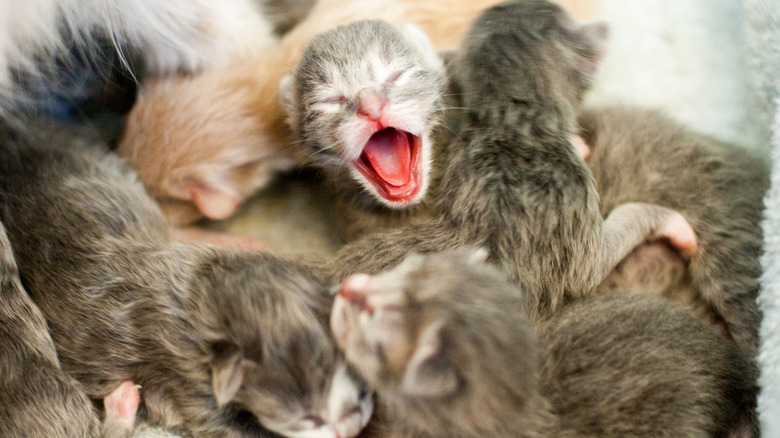How Long After A Cat's Water Breaks Should She Have Her Kittens?
If you are not an experienced cat breeder you may have questions regarding pregnancy in cats and the birthing process. Like humans, cats develop inside the mother's womb and are born live. While pregnancy is different for every cat, many cats exhibit certain symptoms prior to giving birth. Some of these symptoms include restlessness, diarrhea and the release of amniotic fluid — this is usually referred to as a cat's water breaking.
Pregnancy in Cats
The typical gestation period in cats is 63 to 65 days, though some pregnancies may only last around 60 days while others may be extended to 70. A veterinarian can usually confirm pregnancy after the 17th day of gestation. The vet will palpitate the abdomen and feel for the kittens. Do not do this at home because you could inadvertently cause a miscarriage. Like humans, pregnant cats sometimes experience morning sickness. This symptom is likely to be present after the third week of pregnancy.
Water Breaking
Whereas the birth of a human baby is typically preceded by the mother's water breaking, this does not always happen in cats. In the womb, kittens develop in individual sacs filled with amniotic fluid. While sometimes these sacs break prior to birth, they often do not. If your cat's water breaks, it will likely happen just before she begins to give birth. If several hours pass after your cat's water breaks, it could mean that one of the kittens is stuck in the birth canal and you should call a veterinarian.
Stages of Labor
Pregnant cats go through three stages of labor. During the first stage the pregnant cat will begin preparing a nest by kneading or rearranging the area she has chosen for giving birth to her kittens. The cat may also experience rapid breathing or increased heart rate and there may be some discharge from the nipples. The first stage of labor typically lasts between 12 and 24 hours. The second stage may involve forceful straining, vocalization and fluid around the genitals. Once the nose of a kitten is visible in the birth canal, it should be fully delivered within 15 minutes. The third stage consists of delivering each kitten's placenta once they are born.
Cat Pregnancy Tips
When your cat approaches the end of the gestation period she will begin to prepare a nesting site. You should provide your cat with a box in which to give birth and line it with newspapers or an old blanket. Feed your pregnant cat a healthy diet that is high in protein and calcium. Some veterinarians recommend feeding pregnant cats kitten food because it contains high levels of these nutrients. If your pregnant cat stops eating for more than 24 hours, becomes lethargic or experiences a sudden spike in temperature, contact your veterinarian immediately.
Always check with your veterinarian before changing your pet's diet, medication, or physical activity routines. This information is not a substitute for a vet's opinion.
